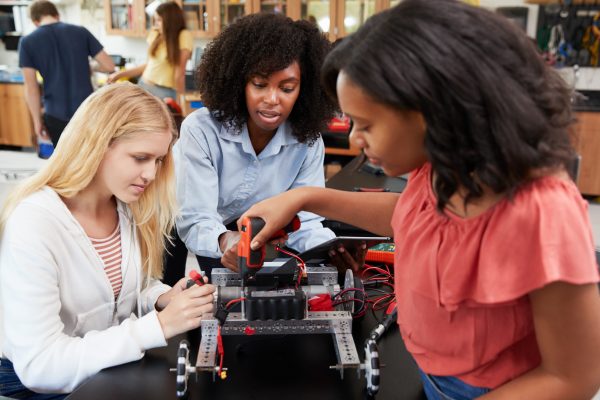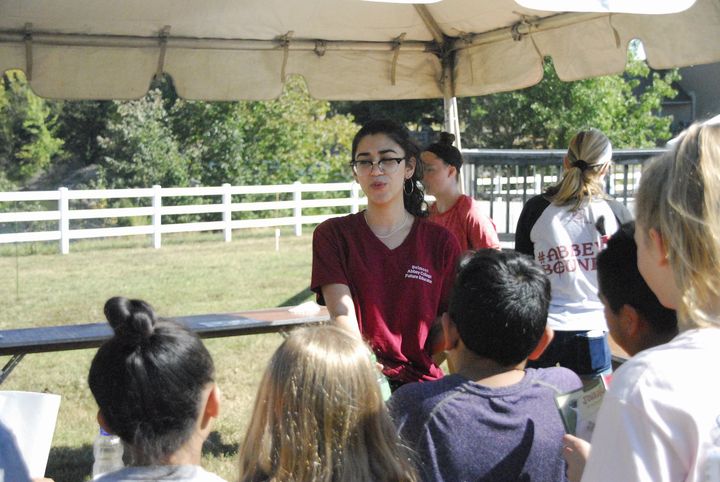The Center for STEM Education: Finding New Paths on Teaching Math, Science, and Engineering

The Center for STEM Education (CSTEM) is changing how we think about what education can be. They believe education should respond directly to the world’s needs and challenges, and they want people to know how they can help.
Jordan Register is a former high school math teacher and doctoral student at UNC Charlotte who is reimagining high school math education. “Mathematics that’s taught in schools is often not actually how we’re using math in the digital age, which is why students don’t feel any connection to it, she said.”
CSTEM matches the STEM and education resources of UNC Charlotte to the needs of the surrounding schools to improve PreK-12 mathematics, science, and engineering education in North Carolina.
The Center provided a platform through Summer Ventures, a four-week program for high school students on campus, for Register to design and pilot a new course to explore the consequences and ethical decisions surrounding how data is used. “The algorithms that inform practices in anything from health insurance to college acceptance to facial recognition technology—or even, more recently, social media—all rely on historical data that’s heavily biased,” she explained.
Her team consists of students and professors from a variety of disciplines, and she is in the midst of a comparative study with a team in Sweden. Her hope is that the research will pave the way for a radical rethinking of high school math courses. “Grappling with these real-world issues while learning mathematics in high school is essential for preparing students for the realities of how math and data science shape our material world,” she said.
Jenny Kant is a doctoral student and a ten-year veteran of high school education. She is designing a course for Summer Ventures in nanoscale science with an emphasis on media literacy. “Students have constant access to media, so there’s a critical need to be able to interpret scientific information that is as close to the truth as possible and prevents misunderstanding, mistrust, or bias,” she said. “We’re focusing on hands-on science, conceptual learning, how to do research, what goes into research, and how to interpret data.” Like Register, her team represents a cross-section of disciplines within the university, from chemistry to biology to optics and engineering. “There’s so much more to learning,” she observed. “CSTEM is about taking disciplines out of their boxes, and adding back that love of learning and curiosity that comes from marrying these disciplines in consequential ways.”
CSTEM’s guiding mission is to identify what education is and what’s important about it. “Our focus is not just on discipline-based research, we’re also working within those disciplines around STEM pedagogy itself. We’re showing the significance of paying attention to these disciplines and how they interact,” said David Pugalee, director of CSTEM.
The goal is to develop educational strategies and critical thinking that reflect real-world needs and to incorporate this thinking into how students are taught.
The issue at stake is whether the U.S. can satisfy the demand for STEM workers in an increasingly globalized, technology-driven world. STEM education has long-lasting implications for economic development on the local, state, and national levels. “We’re behind in addressing the lack of qualified candidates for high-tech jobs,” Pugalee noted. “We need to think about what the educational trajectory looks like that’s going to allow countries like ours to address these needs.”
CSTEM believes this trajectory must start well before college. The Center offers nearly 30 programs each year, totaling 2,000 hours of professional development, coursework, enrichment activities, outreach consultations with faculty, and competitions. In addition, it serves over 10,000 community and business partners, including school personnel, university faculty, PreK-12 and university students, and parents.

CSTEM is also the regional sponsor for the NC Science and Engineering Fair and will host the North Carolina Junior Science and Humanities Symposium in 2022, which gives high school students the opportunity to participate in a national competition that recognizes original STEM research. Some of their PreK-12 programs include:
-
Mathematics Instruction using Decision Science and Engineering Tools (MINDSET), which helps fourth-year high school math students formulate and solve multi-step problems and interest results
-
Pre-College Program
-
Summer Ventures in Science and Mathematics
-
Student Competitions
-
Urban Student Alliance for STEM Education
-
Annual Conference
-
Research
-
Study Abroad
CSTEM also focuses on underserved communities and minority populations. “We’re connecting with the Latinx community by partnering with LAWA (Latin Americans Working for Achievement),” said Pugalee. “One of the Center’s desired outcomes is the broadening participation from a variety of perspectives and cultures.” Pugalee has recently authored a grant in collaboration with the National Science Foundation that specifically targets middle schools in both Charlotte and Raleigh with relatively high African-American and Latinx populations, the goal of which is to develop innovations in curriculum design and expertise in integrative planning.
“There are so many inequities in public schools,” Register noted. “That is why I came back, started this program, and partnered with CSTEM.” For Kant, the Center provided the framework and the funding to support her research interests. “They provided the money and the logistical support,” she said.
Pugalee is working on over a dozen multidisciplinary grant proposals, and their research is attracting the attention of national donors. “More and more,” he said, “the research being done has an educational component. There’s invariably a piece of it that always relates back to teaching and learning and, for that reason, we can support them. We’d really like to work with more faculty around that component, and many faculty and students aren’t aware that there’s a resource for them and that we have expertise in securing funding.”
For Register, the Center was critical in helping her in more ways than one. “CSTEM has given me so many connections with people that I need to further my work. They paid for my travel and supplies. They’re incredible mentors. They helped me with grant writing skills, and I’ve yet to write one that hasn’t gotten funded,” she said.
The Center will continue to promote a unified vision for education, develop leaders, and facilitate interdisciplinary partnerships across the campus, region, state, nation, and world. Their work highlights how important STEM education is for shaping the future. “We’re in constant dialogue with the broader STEM community,” said Pugalee, “which means that for students who are looking for new opportunities, CSTEM provides those opportunities.”